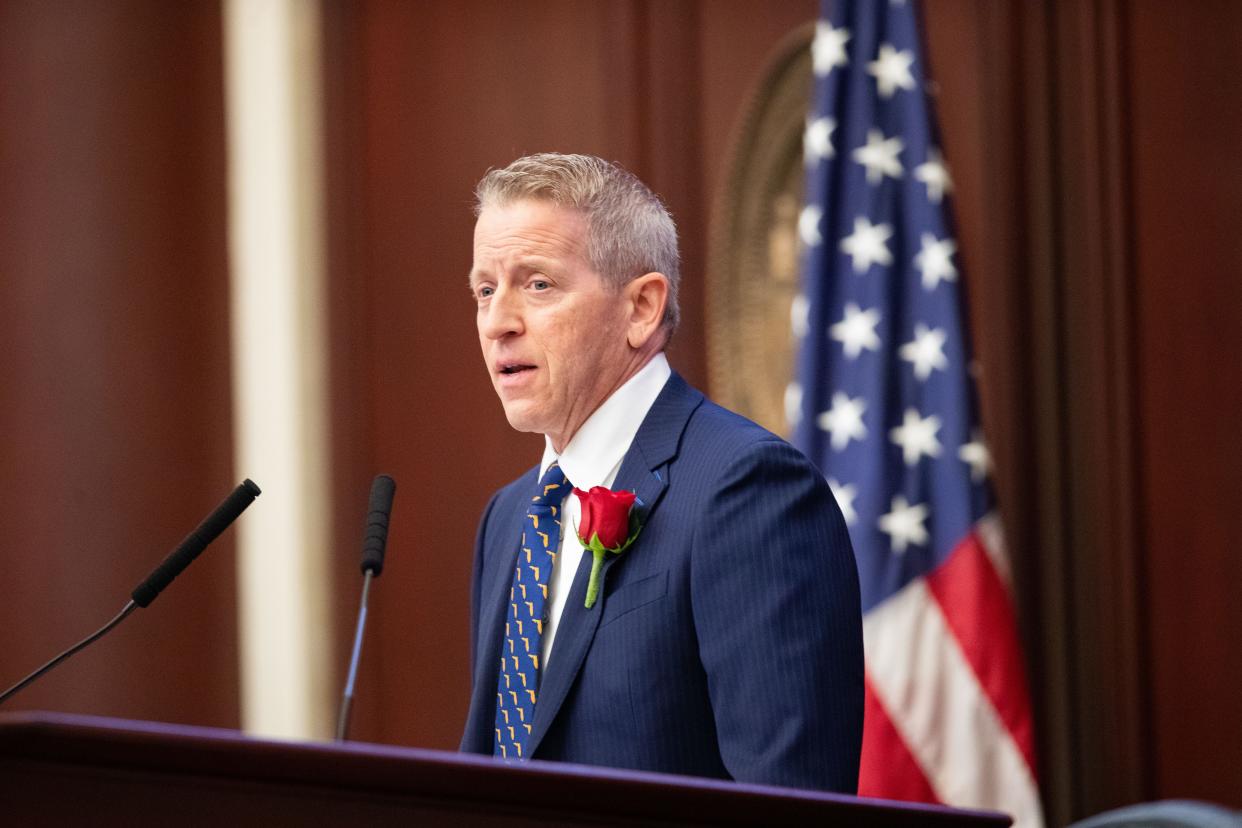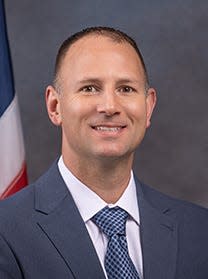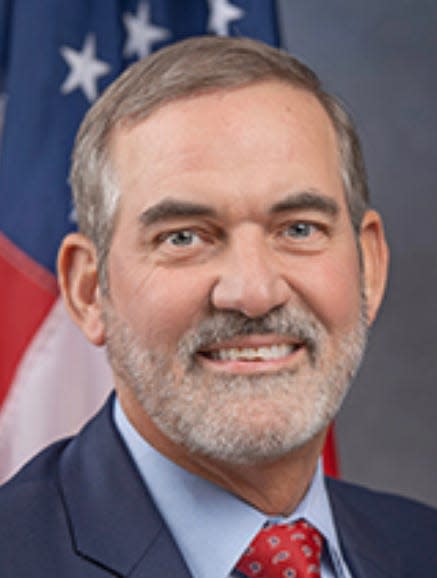Here are 5 bills filed by central Florida legislators that are sure to trigger debate

- Oops!Something went wrong.Please try again later.
- Oops!Something went wrong.Please try again later.
The Florida legislative session kicked off last week and lawmakers have already proposed several bills that will be hotly debated.
A number of them come from Volusia-Flagler area legislators. Here are five of them.
1. Restoring banned monuments
Decades ago, many local city councils and commissions permitted monuments, statues, and memorials to be erected on public grounds. In the South, Florida included, those included tributes to the Confederacy. Some of those monuments have been removed.
In Daytona Beach, for example, three plaques honoring soldiers of the Confederacy were removed from Riverfront Park. This took place just two weeks after the deadly 2017 Charlottesville, Virginia riot where white nationalist hate groups marched in support of keeping a statue of Confederate Gen. Robert E. Lee in a city park and a counterdemonstrator was killed.
HB 395, a bill cosponsored by Rep. Webster Barnaby, R-Deltona, would bar the removal of monuments not just in the future, but also retroactively to Jan. 1, 2017. It makes cities liable for past memorial removals. Parties with standing include any person who regularly used the monument "for remembrance."
The bill states officials who remove or destroy historical monuments can face a $5,000 fine, with those "who knowingly and willfully" violate the law subject to removal from office by the governor.
Under the bill, some cities would be required to replace Confederate memorials years after their removal. It also raises questions about the Legislature's own decision to remove from the U.S. Capitol a statue of Confederate Gen. Edmund Kirby Smith and replace it in 2022 with a marble rendering of educator and civil-rights leader Mary McLeod Bethune.
2. Age-verification requirements for porn websites
At least eight states, including Louisiana, Texas and North Carolina, have passed legislation requiring websites with content harmful to minors, such as pornography, to use age-verification technology.
Rep. Chase Tramont, R-Port Orange, has proposed the same thing for Florida in HB 3, while House Speaker Paul Renner identified it as a priority in his session opening address.

"For far too long, this issue has gone unchecked and, frankly, we as a society owe an apology to the children and families that have been devastated by unrestricted access to materials harmful to minors," Tramont said.
His bill requires the websites to employ an unaffiliated third party to verify users' ages and promptly delete the information it gathers in order to protect users' privacy.
The notion of age requirements to access porn and other materials has not been controversial in these legislative votes. Tramont called it "common sense" and "bipartisan." The Texas bill passed the House 133-1. But it ran into legal challenges.
A federal judge in Texas last year agreed with a trade association for the adult industry, the Free Speech Coalition, and struck down the law, ruling that it violates free speech rights and was overbroad. Later, the U.S. 5th District Court of Appeal overturned the judge's ruling, allowing Texas to enforce the law.
Also, ahead of the North Carolina law's implementation, one of the adult industry's most visited sites, Pornhub, cut off access to users in that state.
3. Volunteer chaplains for public schools
Another bill mimicking a Texas law would allow for volunteer chaplains to meet with students in public schools.
HB 931, filed by Rep. Stan McClain, R-Ocala, makes the chaplain program optional for school districts.
The bill states volunteer chaplains must meet the same backgrounding requirements as other noninstructional volunteers and contractors.
School boards would be required to approve policies outlining chaplains' duties. Principals would be required to notify parents of services available, and parents must give written consent before a student can meet with a chaplain, under McClain's bill.

A law allowing chaplains in public schools passed the Texas House 84-60 last May.
"This is clearly a violation of Thomas Jefferson and the founders' idea of the separation of church and state," said First Amendment advocate Merrill Shapiro of Flagler Beach.
"This opens it up to chaplains of Islam, chaplains of Scientology and even chaplains of the Church of the Flying Spaghetti Monster, the church of the Wiccans and the church of Satan," said Shapiro, Atlantic chapter president of the Americans United for the Separation of Church and State. "The schools should stay out of the business of religion. Churches and houses of religion should provide these kinds of services."
4. Restricting minors' access to social media
Another bill also addresses children and the internet. It's not sponsored by a Volusia-Flagler lawmaker, but it's a top priority of House Speaker Paul Renner, a Republican from Palm Coast.
It prohibits minors under age 16 from creating new social media accounts and requires Instagram, TikTok and other social media companies to terminate accounts for users under 16, according to Rep. Tyler Sirois, R-Merritt Island, one of the bill's sponsors.
All social media users will have 90 days to verify their ages for each account, Sirois told a House committee Thursday.

The bill passed its first committee hearing Thursday with just one objection. Rep. Ashley Gantt, D-Miami, who said it contradicts Florida's other "parents' rights" bills.
Renner said in his opening address that social media sites have caused "unprecedented damage to our children's mental health," and the companies that operate them have used tactics to make their sites as addictive as possible.
He pointed to a survey of youths that found 57% had expressed persistent feelings of sadness and depression in the past year, while 30% had thought about suicide in that same timeframe.
“This is the legacy of social media and it is a global problem," Renner said, "but it cannot be the fate of our children, and we must act.”
5. Limiting public access to records
Every year, lawmakers propose new restrictions on records that have been public under Florida's Sunshine Law. In some cases, these arise out of situations that are new and raise few concerns. But others often raise the concerns of government-transparency advocates.
Among the exemptions proposed by Volusia-Flagler lawmakers this year are:
Certain information from organizations that are applying to be banks. This would include the personal financial information and identification numbers of officers, books, business plans and the identity of proposed officers who are currently working at another financial institution. (Rep. Webster Barnaby, R-DeLand)
Personal information of current and former members of the Florida Gaming Commission. (Sen. Travis Hutson, R-Palm Coast)
Bid proposals and replies to state agencies' competitive solicitations. This would also close to the public certain portions of meetings at which agencies negotiate with such bidders and respondents. (Sen. Tom Wright, R-Port Orange)
Records related to the audit or claims resolutions involving contractors and service providers. (Sen. Tom Wright, R-Port Orange)
Portions of meetings of the Audiology and Speech-language Pathology Interstate Compact Commission and its executive committee. Florida is attempting to join 29 other states as part of the compact, which seeks to provide more consumer protection, better access to care and consistent standards for audiologists and speech-language pathologists. (Sen. Tom Wright, R-Port Orange)
This article originally appeared on The Daytona Beach News-Journal: Keep monuments in place? Volusia-Flagler lawmakers file bills

